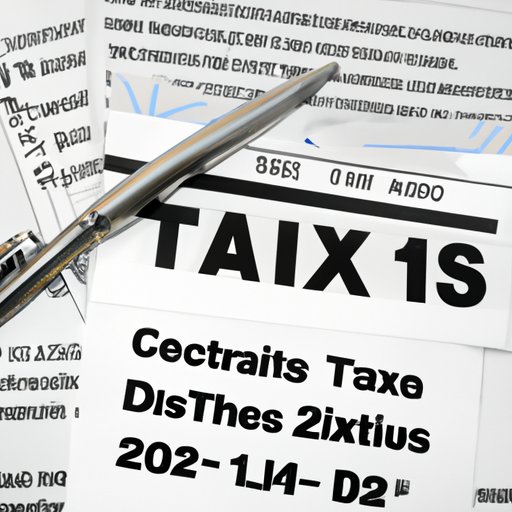Introduction
Tax season can be a stressful time for many individuals, especially those who are not organized or prepared. Filing an extension can provide additional time to make sure everything is in order before submitting a tax return. But what happens if you file an extension? When are taxes due if you file an extension? This article will explore the answers to these questions, as well as provide tips on how to navigate the tax system with an extension.
A Comprehensive Guide to Filing an Extension and When Taxes are Due
Filing an extension gives taxpayers an additional six months to submit their tax returns. It is important to note that filing an extension does not extend the amount of time to pay taxes owed. Taxpayers must still estimate their total tax liability and pay any balance due by the original April 15th deadline. Failure to do so could result in penalties and interest.
To file an extension, taxpayers must submit Form 4868. This form should be submitted electronically or mailed to the IRS by the April 15th deadline. Once the form is received, the taxpayer will receive a confirmation number, which serves as proof that the extension was filed. The taxpayer should keep this number for their records.
The deadline for the extended tax return is October 15th. Any taxes still owed after the April 15th deadline will accrue interest and may incur late payment penalties. The IRS charges late payment penalties at a rate of 0.5% per month, up to 25%. There is also a late filing penalty of 5% per month, up to 25%. Additionally, taxpayers may be liable for the failure-to-pay penalty of 0.5% per month, up to 25%.

Tips for Maximizing Tax Savings with an Extension
One of the primary benefits of filing an extension is the extra time it provides to research potential deductions and credits. Taxpayers should use this time to review their financial situation and look for ways to reduce their overall tax burden. Common deductions include charitable contributions, medical expenses, and student loan interest payments.
Taxpayers should also take advantage of available credits. Credits are typically more beneficial than deductions because they can decrease your tax liability dollar-for-dollar. Examples of credits include the Earned Income Tax Credit (EITC), Child Tax Credit (CTC), and American Opportunity Tax Credit (AOTC).
Another way to reduce taxes owed is to contribute to tax-advantaged accounts such as 401(k)s and IRAs. These accounts allow money to grow tax-free until it is withdrawn, which reduces taxable income. This can help lower the amount of taxes owed and potentially increase the refund amount.

How to Navigate the Tax System with an Extension
Filing an extension can be a great way to get organized and maximize tax savings, but it is important to understand the rules and regulations associated with filing an extension. Taxpayers should familiarize themselves with their tax obligations and seek professional advice if needed. Utilizing tax software can also be helpful in navigating the tax system.
Tax software makes it easier to complete and submit tax returns. It can also provide guidance on deductions and credits that may be available. Additionally, some tax software programs offer free federal e-filing and direct deposit options, which can speed up the refund process.

The Pros and Cons of Filing an Extension: What You Need to Know About When Taxes are Due
Filing an extension can be beneficial for some taxpayers, but there are also drawbacks. Here are some of the pros and cons of filing an extension:
Pros
- Additional time to prepare and submit tax returns.
- Opportunity to research potential deductions and credits.
- Ability to contribute to tax-advantaged accounts.
- Utilization of tax software.
Cons
- Taxes must still be paid by the original April 15th deadline.
- Late payment penalties and interest may apply.
- Increased risk of audit.
Conclusion
Filing an extension can be a great way to get organized and maximize tax savings. It can provide additional time to research deductions and credits and contribute to tax-advantaged accounts. However, it is important to understand the deadlines and penalties associated with filing an extension. Taxpayers should become familiar with their tax obligations and seek professional advice if needed. Utilizing tax software can also be helpful in navigating the tax system.
In conclusion, filing an extension can provide numerous benefits, but it is important to understand when taxes are due if you file an extension. Understanding the rules and regulations associated with filing an extension can help ensure taxes are filed and paid on time, avoiding costly penalties and interest.
(Note: Is this article not meeting your expectations? Do you have knowledge or insights to share? Unlock new opportunities and expand your reach by joining our authors team. Click Registration to join us and share your expertise with our readers.)
